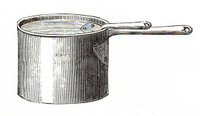 On May 17th …
On May 17th …The siege of Mafeking was lifted on this day in 1900, in the most decisive British victory of the second Boer War. The commander of the garrison was Colonel Robert Baden-Powell (of Boy Scout fame), and the action made him a national hero. As national heroes do, he later wrote his memoir and called it “Lessons from the Varsity of Life”. In it he described the siege food:
… we learned to economise very rigidly in the matter of food, and also to devise food substitutes. When a horse was killed … His skin, after having the hair scalded off, was boiled with his head and feet for many hours, chopped up small, and with the addition of a little saltpetre was served out as “brawn”. His flesh was taken from the bones and minced in a great mincing machine and from his inside were made skins into which the meat was crammed and each man received a sausage as his ration. The bones were then boiled into a rich soup, which was dealt out at the different soup kitchens; and they were afterwards pounded up into powder with which to adulterate the flour. … Our flour was made from the horses’ oats, pounded and winnowed. … We managed thus, however, to issue every man daily a big biscuit of oatmeal. The husks of the oats were put to soak in large tubs of water for a number of hours, at the end of which the scum formed by the husks was scraped off and given as food to the hospital chickens, while the residue formed a paste closely akin to that used by bill-stickers. This was called sowens, a sour kind of mess, but very healthy and filling … Amongst other things we supplied for the invalids in hospital a special blancmange which was made from the Poudre de Riz from the hairdressers and chemists shops.
While they were eating horse sausages, sour porridge and dessert made from hairdressers powder, the soldiers probably fantasised about a simple luxury such as this traditional Scottish oatmeal dish:
Brose.
3 oz. oatmeal; salt to taste, ½ oz butter; boiling water to cover.
Put the oatmeal into a wooden bowl, preferably of birchwood, add the salt and butter and enough boiling water to cover it well. Stir it with a wooden spoon, allowing lumps to form. It is good eaten with sweet milk or buttermilk.
Tomorrow: First, coffee.
Quotation for the Day …
Oats: a grain, which in England is generally given to horses, but in Scotland supports the people. Definition from Samuel Johnson’s Dictionary (1755)
No comments:
Post a Comment